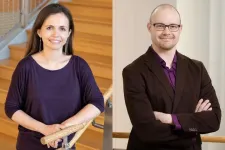Discovery of new protein with an important role in atherosclerosis
2021-03-11
(Press-News.org) Atherosclerosis is the underlying condition that causes heart attacks and strokes. Researchers at Radboudumc in the Netherlands have discovered a protein that appears to play an important role in atherosclerosis. The protein is called Prosaposin, and its role in atherosclerosis was sofar unknown. "We identified Prosaposin as a new potential target for the Science Translational Medicine.
Atherosclerosis is caused by cholesterol that builds up in the vessel wall and triggers chronic inflammation. It has been well established that cholesterol lowering drugs help to treat atherosclerosis. Recent research has shown that inhibiting inflammation can also help to prevent heart attacks and strokes. The challenge now is to find ways to inhibit inflammation specifically in atherosclerosis, without impeding the rest of the body's defenses that protect us against infections.
Increased metabolic rate
The cells primarily responsible for inflammation in atherosclerosis are macrophages. The inflammatory activation of these cells is an energy demanding process. The cells therefore have to increase their metabolic rate considerably. "Unraveling how they do this provides insight into how we can slow down the inflammatory activity and thereby reduce atherosclerosis".
Switch off the power
An international team of researchers, led by Raphaël Duivenvoorden of the Radboudumc in the Netherlands, has investigated what happens when you "switch off the power" of macrophages. The main metabolic switch is a protein complex called mTOR. Using nanotechnology, they were able to specifically turn off this switch in macrophages and investigate its effect on atherosclerosis in a mouse model. "We saw after only a single week of treatment that atherosclerotic lesions shrinked and the inflammation decreased".
New protein discovered
This result sparked their interest in unraveling the molecular mechanism underlying this potent anti-inflammatory effect. Their analyzes consistently revealed an important role for a protein called Prosaposin. Its role in atherosclerosis was sofar unknown. "In additional experiments we found that Prosaposin has an important effect on macrophage's metabolism. We also observed less development of atherosclerosis and vessel wall inflammation in mice that cannot produce Prosaposin. "
Prosaposin and atherosclerosis in humans
To find out if Prosaposin also plays a role in atherosclerosis in humans, they investigated its expression in human atherosclerotic lesions. "We saw substantial expression of Prosaposin by macrophages in atherosclerotic plaques and this was related to their inflammatory activity. It confirms that Prosaposin plays a key role in atherosclerosis, and is a potential new therapeutic target for the treatment of atherosclerosis."
INFORMATION:
More about this research on this video: https://www.youtube.com/watch?app=desktop&v=b6955nNbgkY
ELSE PRESS RELEASES FROM THIS DATE:
2021-03-11
What The Study Did: In this phase 1 study, a single immunization with Ad26.COV2.S (Janssen/Johnson & Johnson) vaccine induced rapid binding and neutralization antibody responses as well as cellular immune responses. Two phase 3 clinical trials are currently underway to determine the efficacy of the Ad26.COV2.S vaccine.
Authors: Dan H. Barouch, M.D., Ph.D., of Beth Israel Deaconess Medical Center in Boston, is the corresponding author.
To access the embargoed study: Visit our For The Media website at this link https://media.jamanetwork.com/
(doi:10.1001/jama.2021.3645)
Editor's Note: Please see the article ...
2021-03-11
Does a warmer climate mean more dry land? For years, researchers projected that drylands -- including deserts, savannas and shrublands -- will expand as the planet warms, but new research from the Harvard John A. Paulson School of Engineering and Applied Sciences (SEAS) challenges those prevailing views.
Previous studies used atmospheric information, including rainfall and temperature, to make projections about future land conditions. The real picture is more complicated than that, said Kaighin McColl, Assistant Professor of Earth and Planetary Sciences and of Environmental Science and Engineering at SEAS and senior author ...
2021-03-11
AMES, Iowa - Parents would never give their children the keys to the car without supervised training and driver's education. An Iowa State University researcher says parents and educators need to take a similar approach before handing children a keyboard to access the digital world.
ISU psychology professor Douglas Gentile worked with the DQ (Digital Intelligence) Institute, an international think tank, to design a framework for digital literacy education. In a commentary, published by the journal Nature Human Behaviour, Gentile and his colleagues outlined how the COVID-19 pandemic has accelerated ...
2021-03-11
What do you do after solving the answer to life, the universe, and everything? If you're mathematicians Drew Sutherland and Andy Booker, you go for the harder problem.
In 2019, Booker, at the University of Bristol, and Sutherland, principal research scientist at MIT, were the first to find the answer to 42. The number has pop culture significance as the fictional answer to "the ultimate question of life, the universe, and everything," as Douglas Adams famously penned in his novel "The Hitchhiker's Guide to the Galaxy." The question that begets 42, at least in the ...
2021-03-11
CHAMPAIGN, Ill. -- Charitable donations account for about 2% of gross domestic product in the U.S., but it's not well-understood whether an event such as a deadly storm inspires increases in charitable giving or simply reallocates a fixed supply of donation dollars that would have otherwise gone to another cause.
A new paper from a team of University of Illinois Urbana-Champaign experts finds that, in the aftermath of catastrophic tornadoes, charitable giving to alleviate an unanticipated event doesn't necessarily crowd out monetary donations to ...
2021-03-11
Millions of people die prematurely every year from diseases and cancer caused by air pollution. The first line of defence against this carnage is ambient air quality standards. Yet, according to researchers from McGill University, over half of the world's population lives without the protection of adequate air quality standards.
Air pollution varies greatly in different parts of the world. But what about the primary weapons against it? To find answers, researchers from McGill University set out to investigate global air quality standards in a study published ...
2021-03-11
The idea was so far-fetched it seemed like science fiction: create an observatory out of a one cubic kilometer block of ice in Antarctica to track ghostly particles called neutrinos that pass through the Earth. But speaking to Benedickt Riedel, global computing manager at the IceCube Neutrino Observatory, it makes perfect sense.
"Constructing a comparable observatory anywhere else would be astronomically expensive," Riedel explained. "Antarctica ice is a great optical material and allows us to sense neutrinos as nowhere else."
Neutrinos are neutral subatomic particles with a mass close to zero that can pass through solid materials at near the speed of light, rarely reacting with normal matter. They were first detected in the 1950s in experiments that operated ...
2021-03-11
Scientists using NASA's Hubble Space Telescope have found evidence that a planet orbiting a distant star may have lost its atmosphere but gained a second one through volcanic activity.
The planet, GJ 1132 b, is hypothesized to have begun as a gaseous world with a thick hydrogen blanket of atmosphere. Starting out at several times the diameter of Earth, this so-called "sub-Neptune" is believed to have quickly lost its primordial hydrogen and helium atmosphere due to the intense radiation of the hot, young star it orbits. In a short period of time, such a planet would be stripped down to a bare core about the size of Earth. That's when things got interesting.
To the surprise of astronomers, Hubble observed an ...
2021-03-11
ROCHESTER, Minn. -- Ten days after receiving a second dose of a messenger RNA, or mRNA, vaccine for COVID-19, patients without COVID-19 symptoms are far less likely to test positive and unknowingly spread COVID-19, compared to patients who have not been vaccinated for COVID-19. The Pfizer-BioNTech and Moderna messenger RNA vaccines for COVID-19 are authorized for emergency use in the U.S.
With two doses of a messenger RNA COVID-19 vaccine, people with no symptoms showed an 80% lower adjusted risk of testing positive for COVID-19 after their last dose. Those are the findings of a Mayo Clinic study of vaccinated patients. These finding appear in the journal Clinical Infectious Diseases.
The authors say these findings underscore ...
2021-03-11
A study conducted by researchers at the University of Rochester Medical Center (URMC) - in collaboration with several other universities - indicates that breastfeeding women with COVID-19 do not transmit the SARS-CoV-2 virus through their milk, but do confer milk-borne antibodies that are able to neutralize the virus.
The study, "Characterization of SARS-CoV-2 RNA, antibodies, and neutralizing capacity in milk produced by women with COVID-19," published on February 9 in the journal mBio - analyzed 37 milk samples submitted by 18 women diagnosed with COVID-19. None of the milk samples were found to contain ...
LAST 30 PRESS RELEASES:
[Press-News.org] Discovery of new protein with an important role in atherosclerosis


